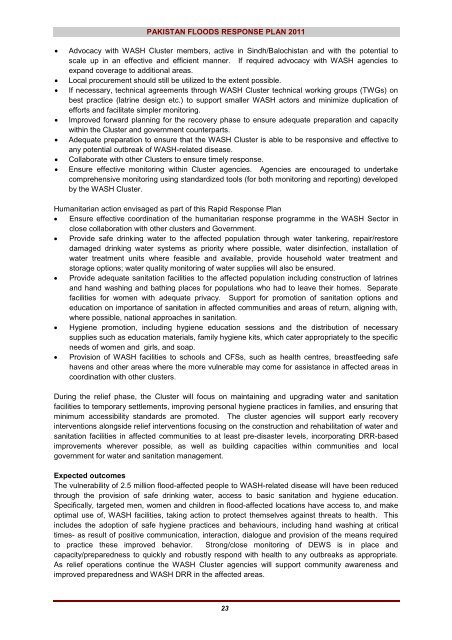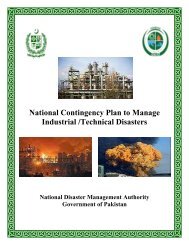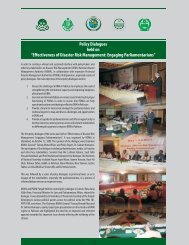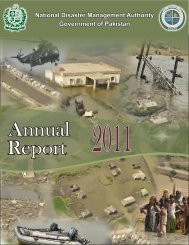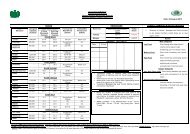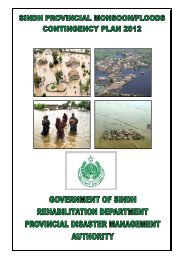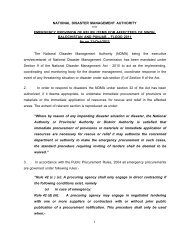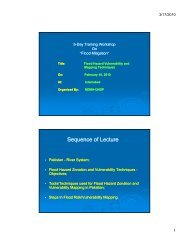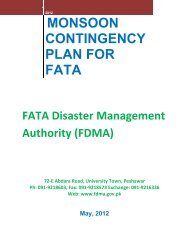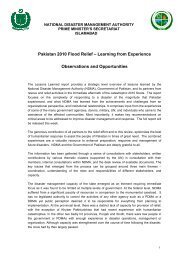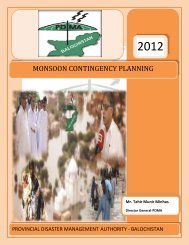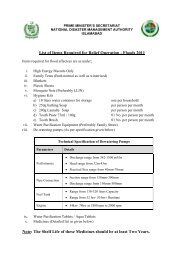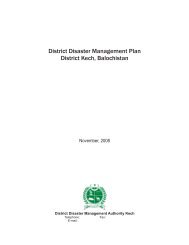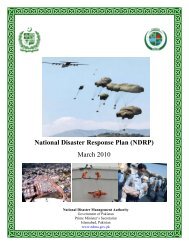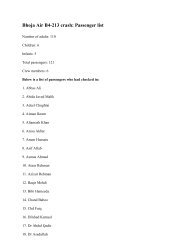Pakistan Floods 2011 - Humanitarian Response
Pakistan Floods 2011 - Humanitarian Response
Pakistan Floods 2011 - Humanitarian Response
- No tags were found...
Create successful ePaper yourself
Turn your PDF publications into a flip-book with our unique Google optimized e-Paper software.
PAKISTAN FLOODS RESPONSE PLAN <strong>2011</strong> Advocacy with WASH Cluster members, active in Sindh/Balochistan and with the potential toscale up in an effective and efficient manner. If required advocacy with WASH agencies toexpand coverage to additional areas. Local procurement should still be utilized to the extent possible. If necessary, technical agreements through WASH Cluster technical working groups (TWGs) onbest practice (latrine design etc.) to support smaller WASH actors and minimize duplication ofefforts and facilitate simpler monitoring. Improved forward planning for the recovery phase to ensure adequate preparation and capacitywithin the Cluster and government counterparts. Adequate preparation to ensure that the WASH Cluster is able to be responsive and effective toany potential outbreak of WASH-related disease. Collaborate with other Clusters to ensure timely response. Ensure effective monitoring within Cluster agencies. Agencies are encouraged to undertakecomprehensive monitoring using standardized tools (for both monitoring and reporting) developedby the WASH Cluster.<strong>Humanitarian</strong> action envisaged as part of this Rapid <strong>Response</strong> Plan Ensure effective coordination of the humanitarian response programme in the WASH Sector inclose collaboration with other clusters and Government. Provide safe drinking water to the affected population through water tankering, repair/restoredamaged drinking water systems as priority where possible, water disinfection, installation ofwater treatment units where feasible and available, provide household water treatment andstorage options; water quality monitoring of water supplies will also be ensured. Provide adequate sanitation facilities to the affected population including construction of latrinesand hand washing and bathing places for populations who had to leave their homes. Separatefacilities for women with adequate privacy. Support for promotion of sanitation options andeducation on importance of sanitation in affected communities and areas of return, aligning with,where possible, national approaches in sanitation. Hygiene promotion, including hygiene education sessions and the distribution of necessarysupplies such as education materials, family hygiene kits, which cater appropriately to the specificneeds of women and girls, and soap. Provision of WASH facilities to schools and CFSs, such as health centres, breastfeeding safehavens and other areas where the more vulnerable may come for assistance in affected areas incoordination with other clusters.During the relief phase, the Cluster will focus on maintaining and upgrading water and sanitationfacilities to temporary settlements, improving personal hygiene practices in families, and ensuring thatminimum accessibility standards are promoted. The cluster agencies will support early recoveryinterventions alongside relief interventions focusing on the construction and rehabilitation of water andsanitation facilities in affected communities to at least pre-disaster levels, incorporating DRR-basedimprovements wherever possible, as well as building capacities within communities and localgovernment for water and sanitation management.Expected outcomesThe vulnerability of 2.5 million flood-affected people to WASH-related disease will have been reducedthrough the provision of safe drinking water, access to basic sanitation and hygiene education.Specifically, targeted men, women and children in flood-affected locations have access to, and makeoptimal use of, WASH facilities, taking action to protect themselves against threats to health. Thisincludes the adoption of safe hygiene practices and behaviours, including hand washing at criticaltimes- as result of positive communication, interaction, dialogue and provision of the means requiredto practice these improved behavior. Strong/close monitoring of DEWS is in place andcapacity/preparedness to quickly and robustly respond with health to any outbreaks as appropriate.As relief operations continue the WASH Cluster agencies will support community awareness andimproved preparedness and WASH DRR in the affected areas.23


